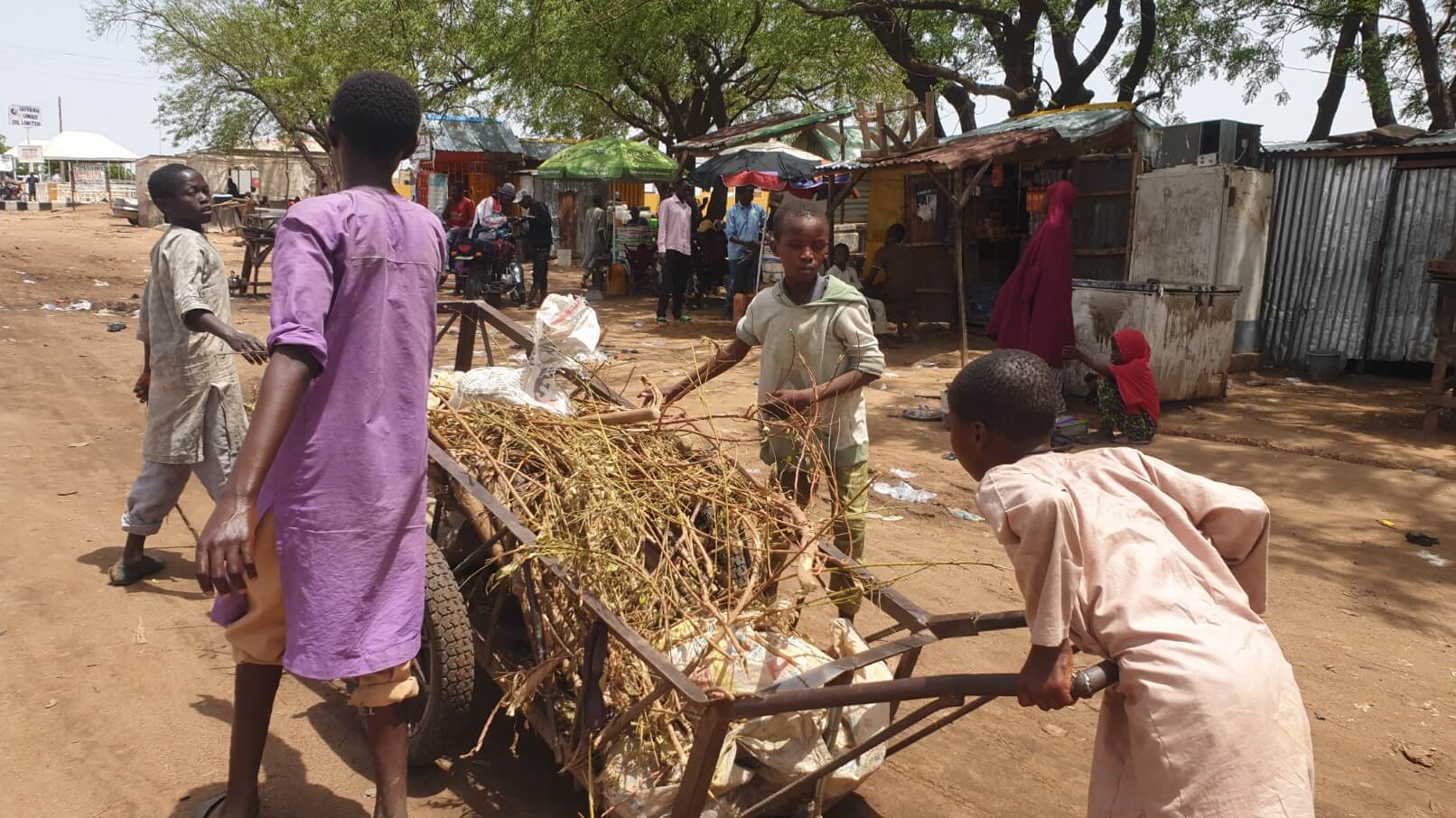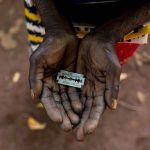GUSAU, ZAMFARA: Two years ago, Ya’u Idris’ father brought him from Jega in Kebbi State and left him in the hands of a Qu’ranic teacher they call ‘Malam’ in Gusau, Northwest Nigeria’s Zamfara State.
His parents barely visit the nine-year-old, and instead of learning about Islam, Idris now roams the streets begging for alms and jobs, as that is the only guarantee for his feeding.
The story is nearly identical for 10-year-old Samisu Abdullahi, who regularly visits the Central Motor Park in Gusau. Despite being enrolled in a Qur’anic school, Samisu and other young boys dressed in tattered clothes and holding bowls are often seen at the city’s motor park during school hours. They beg for food and alms or seek menial jobs such as plate washing and running errands for travellers waiting to board vehicles.
“They are well known to us, and they do all kinds of menial jobs for anybody in as much they will be compensated,” said Adamu Yushu’a, a tea seller at the motor park. “As you can see [them] pushing truckloads, they jointly undertake any task that requires more energy. They work as a team.”
Hundreds of other underage children, ostensibly enrolled in Quranic education, wander through the bustling park and various prominent locations in the state capital, all in pursuit of sustenance.
“We have many of them who, after their Quranic lessons, go out to look for what they will feed on. There are thousands of children who are mostly Almajiri pupils [Quranic students] in this state,” Yushu’a explained.
Who is an Almajiri?
The word “Almajiri” is derived from the Arabic “Al muhajirun” and translates to emigrant. It usually refers to a person who migrates from his home to a popular teacher in the quest for Islamic knowledge.
The system is well practised in most northern Nigeria states, where Muslims have used it as the medium of acquiring Islamic knowledge for centuries.
Originally, in centuries past, the system was designed for discipleship and religious training. In this traditional practice, young children, often below the age of 14, were sent to distant villages, towns, or even other states to learn more about Islam.
However, the Almajiri system has undergone significant changes in recent decades driven by social and economic factors rather than adhering to its original Islamic teachings and values.
Regrettably, most Almajiri children have become a source of cheap labour, contributing to the alarming statistic of over 15 million children in Nigeria involved in child labour, as reported by the International Labour Organization or ILO.
Many malams the kids are living with and studying under force the children to beg and do menial jobs every day and bring them (malams) returns.
“Rather than the children focusing on the religious teachings, they are forced to endure and to feed themselves by daily besieging major parks, roadsides, and other public places to beg or do menial jobs,” said Bala Jega, a resident in Gusau.
But the teachers forcefully collect the money from the kids, Jega said.
To also support himself, Samisu gathers solid waste from the neighbourhood and pushes it in a wheelbarrow to a refuse dump in Gusau, Zamfara state capital, in exchange for leftover food.
“Most days, I get a portion of cooked rice as a payback for any chore job like cleaning the neighbourhoods”, he recounts.
Shafa’atu Adamu, a Guidance and Counseling specialist based in Sokoto, emphasised that the primary responsibility for a child’s well-being rests squarely on their parents’ shoulders. This responsibility encompasses providing comprehensive care and protection for the child until they reach the age of 18 and achieve maturity.
“Section 277 of the Child Rights Act (2003) defines a child as a person who has not attained the age of eighteen (18). It further says Children deserve to grow up in a happy, safe, healthy, productive and enabling environment for learning and development.” She noted.
Skipping the knowledge?
The almajiri children who miss years of formal schooling make up the bulk of Nigeria’s out-of-school children indices. According to thelatest global dataon out-of-school children by the United Nations Educational, Scientific and Cultural Organisation (UNESCO), the country now has about 20 million out-of-school children. And states like Zamfara have the highest burden of out-of-school children, according to UNICEF.
In 2020, during the wake of the Covid-19 pandemic, some states, mostly in the north, repatriatedthousands of almajiri children back to their home states after they tested positive for coronavirus.
TheNorthern Governors Forum,which initiated the move, said the COVID-19 pandemic provided the opportunity to determine the state of almajiri education amidst the spread of COVID-19 among the children.
Most states under the forum also reviewed the law that formally prohibited such a system in their state. At the same time, the parents of the children were tracked and properly trained on parental responsibilities in order to efficiently and effectively enforce the proposed model for the children.
But it was a good system
Despite the numerous controversies and varying public opinions surrounding the practice, Zamfara stands out as one of the Muslim-majority states in Nigeria that continues to uphold Islamic traditions like the almajiri system.
In 1999, the state government, under the leadership of Governor Sani Yerima, reintroduced Sharia law in the state. Many public analysts believe that this move further solidified the state’s reputation as a centre for almajiri pupils.
However, it’s important to note that the almajiri system has not always been viewed negatively. In fact, some individuals attribute their success in life to their experiences within the Almajiri System. Isah Alhaji, an Islamic teacher at Zawiyyah Islamiyah School in Gusau, testified to the system’s positive impact on certain individuals.
“I started as an almajiri in this school,” he stated. “My experiences as an almajiri pupil have been so memorable without any form of injustice. I have spent about twenty years in this school and enjoy every day here either as a pupil or as a teacher. I was both cared for by my parents and teachers within the school during my studies.”
Alhaji said from being an almajiri “I graduated and enrolled in tertiary education. Now I am a teacher in the same school, so that is what I expected from the pupils studying in this school.”
The Islamic teacher said the school, founded some decades ago by a popular Islamic scholar, Sheikh Atiq Zawiyya, now houses between 17,000 to 20,000 almajiri pupils.
“Most of these children did not return to their homeland after the completion of their quranic studies; rather they see their abode as the gateway to start searching for their means of livelihoods. In most cases these children move into urban areas in search of their future,” says Ahmed Lawal, a Sokoto-based media practitioner who has extensively reported on issues of Almajiri in the north.
Also, Atiku Balarabe Zawiyyah, an Islamic scholar and erstwhile special adviser to the immediate past governor in Zamfara state on Almajiri Welfare and Islamic Organisation Board, said the fact some successful northwestern politicians are products of the almajiri system is proof that the system can overcome the challenges it is facing.
“This act has nothing to do with Almajiri. It is the way people perceive the practice. Most people in the government or business tycoons have one way or another passed through the almajiri system,” he said.
Still Exploitative
Nonetheless, activists continue to emphasise that the current operation of the almajiri system leaves ample room for the exploitation of children. They argue that it also provides parents with an excuse to run away from their responsibilities towards their children.
“It is very unfortunate that most parents are running away from their parenting responsibilities by hiding under this present Almajiri learning system,” said Rabiu Abdullahi Hafsat of Save The Family Health & Advancement Organisation, a local not-for-profit advocating for family well-being.
He said parents who wish to send their children to learn the Quran should provide all that is necessary to care for their children, while Islamic scholars who exploit the kids should be prosecuted.
“They (parents) should sign an undertaking for onward upkeeping of such a child till the completion of the study,” Hafsat, who is also a member of the Child Protection Network, said.
“We also need to charge our Islamic scholars who are not helping matters. They’re not making the needed reform for the system.”
Seeking for Balance
In2020,the Zamfara State government announced a scheme to rebrand the almajiri system, with 52 Quranic Schools from the 14 local government areas in the pilot stage.
Dr Atiku Balarabe Zawiyyah headed the reform committee and said each school would receive bags of grains and cash as a monthly allowance to cater for the pupils under them.
He said that with the initiative in place, Quranic school pupils across the state were relieved from the trouble of searching for food but will instead focus on their studies.
Through its Universal Basic Education Board, the State also integrated 282 Quranic schools into the Basic Education Service Delivery for All (BESDA) programme to ensure that every child has access to free education in the state.Director of social mobilisation on the board, Yusuf Abubakar Mafara, said the integrating effort covers recruitment of new teachers, free uniforms, free feeding and teaching aids.
Though a hard call to make to some parents and Islamic teachers in the conservative Muslim-dominated core northern states like Zamfara who believe Arabic education is all a child needs to flourish, but Abdulkadir Abdulgafar, a Sokoto-based Islamic teacher at Darul Salam School of Arabic and Islamic Studies, advocates the need for Muslim parents to embrace both western and quranic education.
But despite such calls, some parents believe that sending their children to gain formal education could sometimes spark accusations of not being Muslim enough and being enslaved to Western ideas and cultures. Yet, Abdulgafar insists that a balance of Western education and Islamic knowledge would prepare a child to navigate the world.
“[I am] a product of both Western and Islamic education because I’m a degree holder and also vast in Qur’an citation. This is what we are teaching in this Islamic school in accordance with what was laid down by the school’s founding father, a Journalist by profession,” he said.
“Our students are in higher institutions learning various fields after their lessons. They gathered at the school for a Quranic lesson, and most of them aspired to become doctors, lawyers and engineers after the completion of their education. Quranic education can only be an additional knowledge to them,” Abdulgafar concluded.
The Almajiri system in northern Nigeria, intended to provide Islamic education, has become a source of exploitation and child labor. Children like Ya’u Idris and Samisu Abdullahi, instead of focusing on Quranic studies, are forced to beg and do menial jobs to sustain themselves. The original intent of the Almajiri system has eroded due to socio-economic factors, leading to significant hurdles in children's education and welfare.
Efforts to reform the system include initiatives by the Zamfara State government to provide food and integrate Quranic schools with basic education programs, aiming to mitigate the challenges faced by these children. Critics argue that parents and Islamic scholars need to take responsibility and support reforms ensuring the children’s rights and comprehensive education. Balancing Western and Quranic education is advocated as a pathway to better prepare children for future opportunities.





